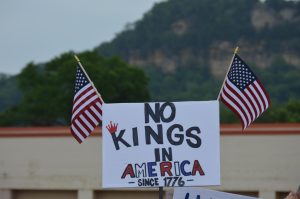Poet speaks of his inspiration, reason for writing
November 6, 2014
On Oct. 29, Sean Thomas Dougherty, a poet, performed at the UW-La Crosse. Dougherty began his performance by giving the audience details about his arrival in Minneapolis and how his luggage was lost on the way, which received a fair amount of laughter from the audience in response.
Dougherty was born in New York City in 1965, and moved to Toledo, Ohio until he was 13, when he and his family moved, yet again, to New Hampshire.
“I went to high school with Adam Sandler, the comedian. We were on the same basketball team. And the coach of the Philadelphia Eagles,” he added laughing, and said, “And so then I became a famous poet.”
Dougherty comes from a multi-racial family. His mother is Hungarian and Jewish, and his father is African American, which, in Dougherty’s works, is a “crucial” element. In his early twenties, Dougherty was involved in two political movements: The Struggle in Northern Islands for Independence Movement and The Struggle Against South Africa Movement.
Dougherty began writing after the death of his good friend, Gary, who died in an accident. He explained that he was able to express his feelings through writing them down in a notebook, which allowed him to realize that words were able to help him cope with the passing of his friend and allowed him move on.
When asked about what emotions and messages he hopes his poems convey, Dougherty answered, “Well, they really vary, ‘cause some are love poems, some are sad poems, some are angry. I write a lot about people who are in struggle, where there are different kinds of addiction or class issues or work and being poor. I think in the end, there’s this idea of going on. Hopefully, if somebody’s feeling despair, in the despairs and joys that I articulate, they’ll feel something that’ll just help them get up the next day.”
Dougherty has had five books published, and they include “Sunset by the Chain-Link Fence,” which was his first book published in 1993, “The Biography of Broken Things,” “Except by Falling,” “Broken Hallelujahs” and “Nightshift Belonging to Lorca.”
Dougherty performed and read from more than one book in his performance.
“To be a poet, you have to love strangers. Someone you don’t know, who’s going to read your work,” Dougherty expressed. “As you move through life, the better you get at loving, I think the better your art gets.”
Dougherty expressed that there isn’t solely one thing that inspires his poetry, but many things. Dougherty explained that the simplest things in life inspire his works, such as the way the wind feels, the way his daughter’s hair looks when she runs, the shape of a leaf and conversations overheard in his surroundings. Dougherty explained that the language and material for poetry is constant because life is constant.
Dougherty, later that night, performed at the Root Note with William Stobb, an English Professor at UW-L.





